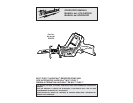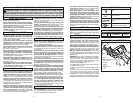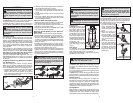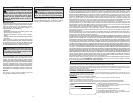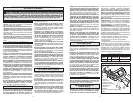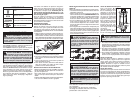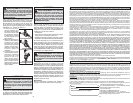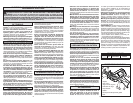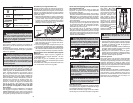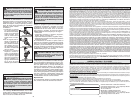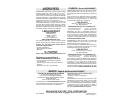
4
5
ASSEMBLY
WARNING Recharge only with the
charger specifi ed for the battery. For specifi c
charging instructions, read the operator’s
manual supplied with your charger and bat-
tery.
Inserting/Removing the Battery
To remove the battery, push in the release buttons
and pull the battery pack away from the tool.
To insert the battery, slide the pack into the body of
the tool. Make sure it latches securely into place.
Selecting a Blade
The Quik-Lok
®
Blade Clamp can be used with
all 1/2" shank universal Hackzall
®
and Sawzall
®
blades. Use MILWAUKEE blades for best perfor-
mance. When selecting a blade, choose the right
type and length. Many types of blades are available
for a variety of applications: cutting metal, wood,
nail-embedded wood, scroll cutting, roughing-in,
and contours.
Many lengths are also available. Choose a length
long enough to extend beyond the shoe and your
work throughout the stroke. Do not use blades
less than 3-1/2" long since they won’t extend
beyond the shoe throughout the stroke.
For best performance and longest life, see your
MILWAUKEE Electric Tool catalog or go online to
www.milwaukeetool.com to select the best blade
for the job.
Installing and Removing Blades from the Quik-
Lok
®
Blade Clamp
Remove battery pack before changing blades.
Make sure the spindle and blade clamp areas are
clean. Metal chips and sawdust may prevent the
Quik-Lok
®
Blade Clamp from clamping securely.
1. Depending on the job, the blade may be inserted
with the teeth facing up or down. To install a
blade, twist collar in the direction of the arrow
while inserting the blade into the clamp until the
tang butts against the collar.
WARNING Always remove battery
pack before changing or removing acces-
sories. Only use accessories specifically
recommended for this tool. Others may be
hazardous.
Trigger Lock
To lock the trigger, push
the trigger lock as shown.
The trigger will not work
while the switch is in the
locked position. Always
lock the trigger and remove
the battery pack before
performing maintenance
and changing accessories.
Lock the trigger when stor-
ing the tool and when the
tool is not in use.
To unlock the trigger,
push the trigger lock as
shown.
Fuel Gauge
To determine the amount
of charge left in the battery, pull the trigger. The
Fuel Gauge will light up for 2-3 seconds.
To signal the end of charge, 1 light on the fuel gauge
will fl ash for 2-3 seconds.
WARNING To reduce the risk of injury,
be sure the blade always extends beyond
the shoe and workpiece throughout the
stroke. Blades may shatter if they impact the
workpiece or shoe (Fig. 2).
OPERATION
WARNING Always remove battery
pack before changing or removing acces-
sories. Only use accessories specifically
recommended for this tool. Others may be
hazardous.
WARNING To reduce the risk of injury,
wear safety goggles or glasses with side shields.
2. Release collar and the spring loaded mechanism
will clamp the blade fi rmly in place.
3. Twist collar in the opposite direction of the ar-
row to ensure that the blade is locked into the
clamp.
4. Tug on blade to make sure it is securely locked
in place.
5. To remove a blade, twist collar in the direction of
the arrow while pulling on the blade. Be careful
when handling hot blades.
Quik-Lok
®
Blade Clamp Maintenance
• Periodically clean dust and debris from the Quik-
Lok
®
Blade Clamp with dry compressed air.
• If the collar resists twisting, twist the collar back
and forth to shake debris loose.
• Periodically lubricate Quik-Lok
®
Blade Clamp with
a dry lubricant such as graphite.
Removing broken blades from the Quik-Lok
®
Blade Clamp
Broken blades can be removed by the following:
• Remove battery pack before removing blades.
• Point the tool downward, twist the collar, and
shake the tool up and down (DO NOT turn the tool
on while your fi ngers are holding the blade clamp
open). The shank of the broken blade should drop
out of the clamp.
• If shaking the tool doesn't work - In most cases, a
corner of the broken blade will extend beyond the
blade clamp. Twist the collar and pull the broken
blade out of the clamp by this corner.
• If the broken stub doesn't extend far enough to be
grabbed by its corner, use a thin blade with small
teeth (such as a metal cutting blade) to hook the
blade that is jammed in the clamp while twisting
the collar and pull it out.
Stroke
Fig. 2
WARNING Do not touch blade imme-
diately after use. Blade will be hot.
Starting, Stopping and Controlling Speed
To start the tool, grasp the handle fi rmly and pull
the trigger. An LED is turned on when the trigger
is pulled.
To vary the speed, increase or decrease the pres-
sure on the trigger. The further the trigger is pulled,
the greater the speed.
To stop the tool, release the trigger. Make sure the
blade comes to a complete stop before removing
the blade from a partial cut or laying the tool down.
General Cutting
For straight or contour cutting from an edge, line
the blade up with your cutting line. Before the blade
contacts the workpiece, grasp the handle fi rmly
and pull the trigger. Then guide the tool along your
cutting line. Always hold the shoe fl at against the
workpiece to avoid excessive vibration.
Cutting Metals
Begin cutting at a slow speed, gradually increasing
speed as you cut. When cutting into metals or hard
materials that can not be cut from an edge, drill a
starting hole larger than the widest part of the blade.
Fig. 1
Blade clamp
Blade
Stroke
Fig. 3
Push
for
Lock
Push
for
Unlock
WARNING To reduce the risk of explo-
sion, electric shock and property damage,
always check the work area for hidden gas
pipes, electrical wires or water pipes when
making blind or plunge cuts.
Plunge Cutting
Your MILWAUKEE Hackzall
®
is ideal for plunge cut-
ting directly into surfaces that can not be cut from
an edge, such as walls or fl oors. Do not plunge cut
into metal surfaces (see "Cutting Metals").
1. Insert the blade into the
tool with the teeth facing
down. Hold the tool as
shown, resting the edge
of the shoe on the work-
piece.
2. With the blade just
above the workpiece,
pull the trigger. Using
the edge of the shoe as
a pivot, lower the blade
into the workpiece as
shown.
3. As the blade starts cut-
ting, raise the handle of
the tool slowly until the
shoe rests fi rmly on the
workpiece. Then guide
the tool along your cut-
ting line to acquire the
desired cut.
Fig. 4



